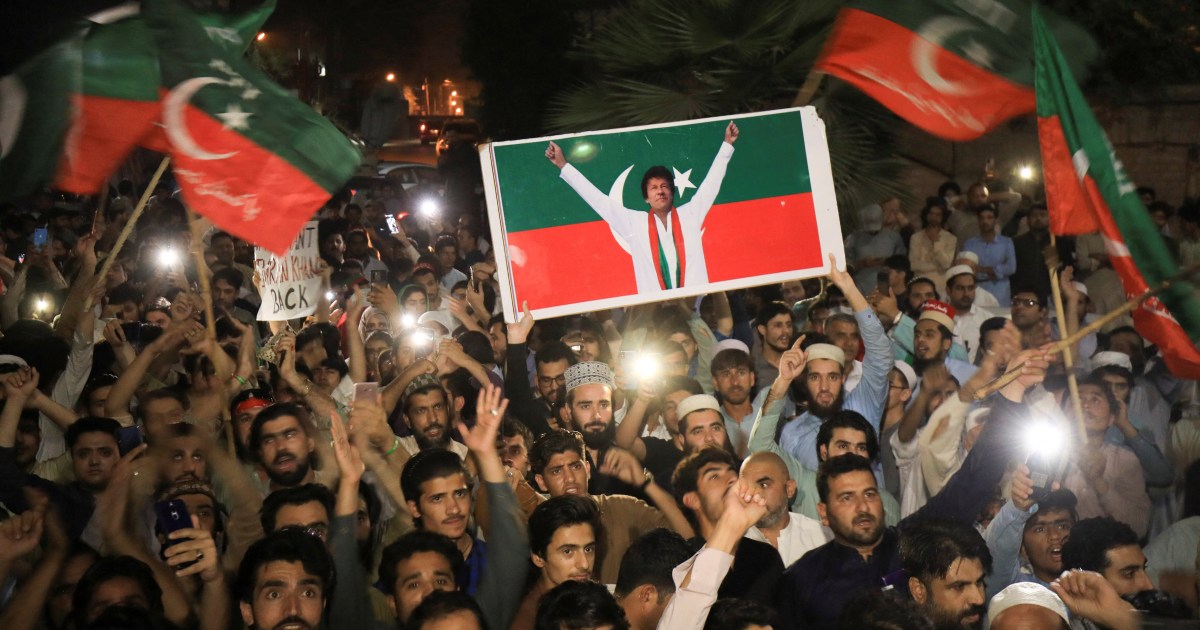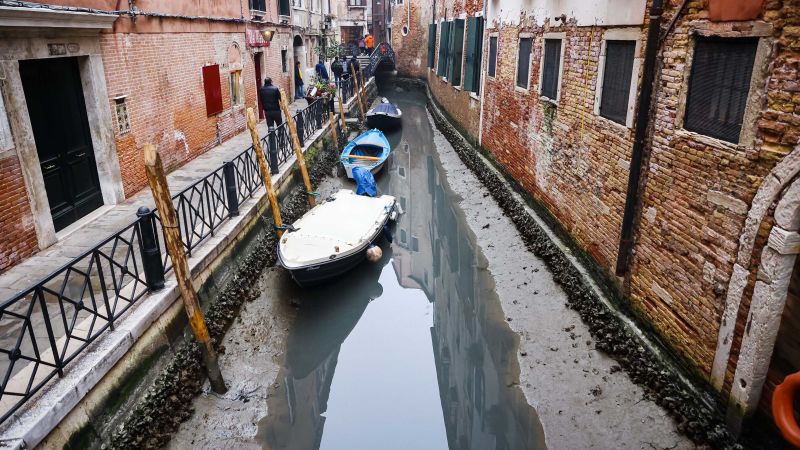How will PM Khan’s removal affect Pakistan’s fragile democracy?
It may sound strange, given there was a parliamentary vote of no confidence, an emergency Supreme Court hearing, boisterous speeches, mysterious helicopter rides, and a clandestine meeting between now-ex Prime Minister Imran Khan and the military and intelligence chiefs, all around midnight local time, but nothing fundamentally important shifted in Pakistan this week.
The transition from Khan’s government to the opposition alliance was the result of an intra-elite power struggle, not a people-based mass mobilisation, such as those of the late 1960s, the late 1980s, or most recently, 2007-08. The military went from propping Khan up to declaring its neutrality. The so-called “electables” of parliament switched sides. The opposition suddenly had the numbers and, poof, Khan was gone – for now.
Given the lack of popular participation in Khan’s removal, the most egregious faults of his so-called “hybrid regime” – the enforced disappearances of activists, the vicious clampdown on media freedom, the imprisonment and harassment of political opponents, the wide and welcoming space given to religious extremists – all stand unchallenged. As such, if any advances are to be made on these scores, it will be because of what happens from here on, not because of what has happened. Absent such structural reform, this weekend will be tantamount to rearranging the deck chairs on the Titanic for a country whose clownish political scene belies the seriousness of its challenges, threats, and potential.
Lessons for the military establishment
The most important lesson of this weekend should accrue to the military: ideally, they would cease engineering political outcomes. Leaving aside the legality or ethics of extra-constitutional machinations, their track record is abysmal.
Half a century ago, military dictator Ayub Khan brought rising political star Zulfiqar Ali Bhutto under his wing. By the early 1970s, Bhutto was the establishment’s choice for balancing the “subversive” Sheikh Mujibur Rahman and Bengali nationalist movement.
But the marriage ended badly: Bhutto was deposed in a coup by General Zia-ul-Haq in 1977 and then sentenced to death under his regime.
Next, in the 1980s, it was Zia’s turn, nurturing the rise of Nawaz Sharif, then a young industrialist. By the end of the decade, Sharif was the establishment’s choice for countering the “dangerous” Benazir Bhutto.
Sure enough, theirs too was an ugly divorce. Sharif was deposed in a coup by General Pervez Musharraf in 1999 and removed from his third stint in power under military pressure in 2017, spending the intervening years being Pakistan’s loudest voice against the military’s role in politics.
Which brings us to the present. The military cozied up to Khan beginning in the early 2010s, first using him and his party, Pakistan Tehreek-e-Insaf (PTI), to pressure the governments of the Pakistan Peoples Party (PPP) and the Pakistan Muslim League-Nawaz (PML-N) from the street and later, in 2018, installing him in power in an election widely considered rigged.
But seasoned observers knew exactly how this movie would end: in shambles, tears, and recrimination, as it did this weekend.
The song remains the same: the generals promote someone they think they can do business with because they are threatened by a popular alternative. A decade or so later, a different general discovers his predecessors were wrong: the junior partner is not, it turns out, as pliable as first assumed. A tussle ensues, the military wins, and the civilian is deposed. If the civilian is not killed but merely imprisoned or exiled, they belatedly discover their democratic credentials and begin politicking against the military, necessitating the next prodigal son. Rinse, repeat.
By now, the lessons for the military establishment should be clear: let the system manage itself. Militaries, whose organisational culture and ethos are characterised by regiment, predictability, and order, cannot fathom the messiness inherent to multi-party democracy. But the (semblance of) disorder attendant with such a system is necessary for a country as large, diverse, and fractious as Pakistan, so as to establish stability at a wider, systemic level.
Moreover, if the utter chaos of the past week shows one thing, it is that the architects of such policies do not know how to produce order. Pakistan has enough security threats, internal and external, for its military and intelligence agencies not to be mired in the business of elections, parties, or politicians.
Setting back the clock
Khan’s dalliance with the military has arguably taken Pakistan back 30 years with respect to its political development. To understand why, we have to step back in time.
The turn of the century found Musharraf’s military authoritarian government entrenched in power. The two major parties, the PML-N and PPP, had each spent the previous decade, the 1990s, acting as the cat’s paws for the military every time it tired of the other, operating in the nebulous space between co-conspirator and collaborator.
In 2006, at the apex of Musharraf’s power, the heads of the two parties, Sharif and Bhutto, both in exile, signed the Charter of Democracy. The document appeared to mark a fundamental shift. Among other things, the pair pledged to never conspire with the military should it destabilise or replace an elected government.
Many cynics dismissed the signatures as mere theatre. But what followed was a momentous time in Pakistan’s political history. The period after Musharraf was removed (2008-2013) saw major gains such as the 18th Amendment, which gave Pakistan’s parliament stronger protections against dismissal or dissolution, a significant achievement. Through an apocalyptic flood, a global recession, and a devastating war against the Taliban, the PPP government handed the reins to the PML-N. It was the first time in Pakistan’s history that the National Assembly had completed its tenure.
Political scientists who study democracy look for a second consecutive free and fair election, not the first, when considering whether to qualify a country as a democracy. It is the peaceful and predictable transition of power from one elected government to another that genuinely marks one as a democracy. Sixty-five years after its birth as a republic, Pakistan had finally achieved this.
During the PML-N’s tenure (2013-2018), the PPP more or less returned the favour, playing the role of loyal opposition. The military was antsy, but without a major party to play ball with, could not get up to its usual tricks. Foreign powers such as the United States had, momentarily, wised up, and signalled to the military that they would not countenance overt interference, as they had before.
As such, there was genuine optimism that Pakistan had taken strides towards shedding its history as a military authoritarian state.
But this progress was always tenuous, with Imran Khan the bull in this delicate china shop. Khan and his PTI, the third force in Pakistani politics, did not care a whit about democratic niceties: he was coming to power, replacing the crooks and criminals he claimed had looted the country, and that was really all there was to it.
His willingness to partner with the military and intelligence agencies, something other major parties had foresworn, meant that Pakistan’s hard-earned progress on the civilian-military front was squandered at the altar of one man’s ego. Pakistan may have gotten that coveted second consecutive relatively free and fair election, but it wasn’t going to get a third.
Parties and democracy
The stage-managed election of 2018, and everything that preceded it, may have convinced the PML-N and PPP of the dictum “if you can’t beat ’em, join ’em”. In coming to an understanding with the military this year to replace Khan – in essence tearing up whatever remained of the dog-eared Charter of Democracy – the PPP and PML-N have played their own ignominious part in turning back the clock to the 1990s. The regression speaks volumes about the lack of ideological commitment of major parties in Pakistan.
But, ironically, it is now, out of power that Khan and his PTI can actually strike a blow for democracy and civilian supremacy, should he choose to couch his fight in such terms. At present he favours blaming his departure on those outside the country rather than inside, adopting a conspiratorial anti-American frame. But were he to directly name the generals that he holds responsible, foremost among them Chief of Army Staff General Qamar Javed Bajwa, and foment stronger opposition against the military, Pakistan’s democracy may be able to salvage something from this rancorous period.
The PTI’s social base, primarily composed of the urban middle class and elite, is almost exactly that which has historically strongly supported the military’s interventions in politics. If Imran Khan explicitly targets Bajwa, the polarisation of this class into pro-Imran and pro-army factions may, unwittingly, sow the seeds of democratic reform. Already, there are some signs that the PTI base is expressing more scepticism about the army’s role in politics. As long as such divisiveness does not spill over into violence, it may, with luck, end up serving Pakistan’s interests in the long run.
But this is grasping at straws. It ignores that Khan does not have a problem with the military, just one military man. It ignores that in politics, memories can be short. Most of all, it ignores that we have been here before, with the military apparently having taken one misstep too far, only for its influence to proceed unimpeded.
The views expressed in this article are the author’s own and do not necessarily reflect Al Jazeera’s editorial stance.




